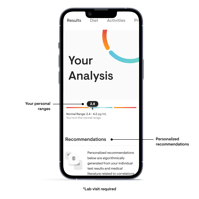Healthy Aging in Your 40s, 50s, and Beyond
Optimize Your Biology to Prevent Premature Wear and Tear
LONGEVITYAGINGEPIGENETICS
Csaba Pecsi
3/3/20253 min read


We’re all familiar with our chronological age—the number of years since we were born—and often feel the pressure as it increases. While we can't stop the passage of time, what truly impacts our health and appearance is our biological age, which refers to the age of our cells. This is the key factor that influences our overall health. The older and more dysfunctional our cells become, the more vulnerable we are to age-related diseases.Biological age can be determined by analyzing several key markers:
Telomeres: Telomeres are protective segments at the ends of chromosomes that shorten with each cell division. The length of your telomeres serves as an indicator of biological age, with shorter telomeres being linked to a higher susceptibility to chronic diseases.
Epigenetic Clocks: DNA methylation patterns, where specific areas of DNA are methylated, are associated with aging. The more methylated DNA a person has in certain areas, the more accelerated their biological age.
Physiological Tests: These measure the health and function of your organs and systems, including blood pressure, VO2Max, cardiovascular fitness, lung capacity, joint health, and mobility.
Cognitive Tests: Assessments of memory, problem-solving, learning abilities, and IQ help determine the health of your cognitive function.
Bodily Fluid Tests and Biomarkers: Tests on blood, urine, and saliva can provide insights into glucose and insulin levels, inflammation, immune function, metabolism, hormones, enzymes, and metabolic byproducts.
If you're looking to get a clearer understanding of your true age, the Biological Age Health Panel is an excellent starting point to help create an individualized plan tailored to you.
Some of the main age-related diseases are:
Atherosclerosis and cardiovascular disease
Hypertension
Strokes
Alzheimers's
Dementia
Arthritis
Cataracts
Osteoporosis
Type 2 diabetes
Cancer
COPD
The following factors have the greatest influence on our health and biological age:
Lifestyle Factors: Diet, exercise, smoking, alcohol consumption, and sleep habits.
Joint Mobility: Increased wear and tear caused by weakness, tightness, or poor mechanics.
Inflammation: Impacted by gut health, lung issues, joint pain, poor sleep, stress, obesity, and toxicity.
Circadian Rhythm Disruption: Issues from irregular bedtimes, mealtimes, medications, stimulants, artificial light, and blue light exposure.
Environmental Pollutants: Exposure to toxins in air, water, food, and household chemicals.
Radiation: Nonnative electromagnetic fields (EMF) from sources like power lines, wifi, smart meters, fluorescent lights, and microwave ovens.
Oxidative Stress: Increased levels of free radicals causing damage to cells.
Blue Light Toxicity: Overexposure to fluorescent lights and prolonged screen time from computers and smartphones.
We have several built-in biological clocks that regulate our growth, circadian cycles, and seasonal rhythms. One of the most important things we can do to restore health and slow down aging is to normalize our circadian rhythm and eliminate all harmful factors as much as possible.
How to Get Younger - Lower Your Biological Age!
Lifestyle factors:
Start your day by stepping outside and facing the sun as it rises.
Limit your intake of caffeine and alcohol.
Minimize exposure to artificial light sources.
Always use a blue light filter on your computer and phone screens when working indoors.
Avoid screen time 1-2 hours before going to bed.
Don’t eat late; aim to finish dinner 2-3 hours before bedtime.
Try to go to bed before midnight, ideally by 10 pm.
Maintain a consistent bedtime and wake-up schedule.
Practice cold thermogenesis, starting with showers and progressing to cool baths.
Move and stretch your muscles daily to prevent muscle loss and joint issues.
Follow a balanced workout routine that includes strength, cardio, agility, balance, and mobility exercises.
Dietary factors:
Stay well-hydrated throughout the day (filtered or spring water)
Make sure to eat plenty of fresh organic vegetables and fruits daily
Choose healthy sources of protein and fat, such as fish, eggs, grass-fed meat, and nuts
Include fermented foods in your daily diet like natto, kimchi, sauerkraut, and apple cider vinegar
Support your gut health by incorporating plenty of Probiotics
Aid digestion and reduce inflammation by using Enzymes for better absorption.
During the colder months, consider supplementing with Vitamin D and K2 based on your Blood levels
Key nutrients to support mitochondria, cellular repair, sirtuin proteins, and NAD+ production ResveraCel
In addition to everything mentioned above, make it a habit to incorporate a daily meditation or relaxation technique into your routine. Personally, I enjoy combining long, relaxing stretches with deep breathing exercises, either after my workout or before bed. Mindfulness practices can actually influence your epigenetics, meaning they have the power to affect your DNA and gene expression! With regular practice, you can deactivate harmful genes, such as those linked to cancer or inflammation, and activate beneficial ones. These practices also help reduce stress hormones, improve digestion and gut health, and boost your mood and overall sense of well-being.
CSPFIT
Personal training, nutrition, and health coaching services.
CONTACT
Contact Us
☎ 203-939-3956
Copywright © 2025 CSPFIT LLC - All rights reserved.


